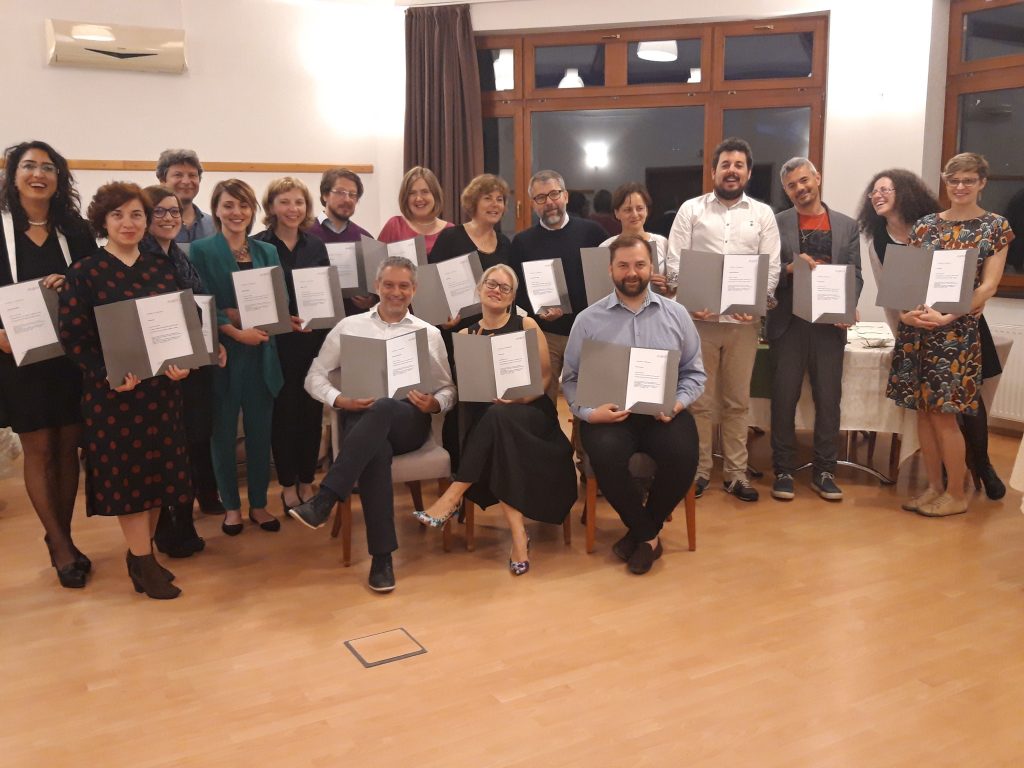At the beginning of May 2019, Brasov hosted the fourth course of the European Palliative Care Academy. The 20 participants from 14 countries, with a wide range of professional qualifications and experiences in developing palliative care, attended the last leadership module before their graduation as the third generation of EUPCA leaders.
After completing the previous modules on Project Management at the University Hospital in Cologne, Research Methods at King’s College in London and the Teamwork module at the Hospice and Nicolaus Copernicus University in Gdansk, in Brasov the participants became familiar with the concept of advocacy. The module enabled the future leaders to understand the cycle of advocacy and specific techniques that would help them in advancing palliative care in their countries and palliative care settings. The sessions were structured so as to bring theoretical aspects and steps in the strategic planning cycle together with practical exercises that participants would apply in their specific advocacy situations. Other topics in the field of advocacy were targeted at developing abilities to analyzing laws and policies and writing position papers or briefing notes, preparing face-to-face meetings with authorities and decision-makers. A special chapter was dedicated to increasing the future leaders’ capacity to deal with the media and understand its manifold facets that can be valued in promoting palliative care to the public. Participants learned to draft press releases and to prepare successful interviews for various types of media; a special share was dedicated to understanding and dealing with modern social media. As a practical exercise, leaders were supported to prepare, record and analyze a short interview.
It became a tradition for all participants to put in practice the interview abilities acquired and give short motivational interviews at the end of the EUPCA leadership course. This was a practical exercise that brought both excitement and satisfaction for successfully speaking in front of cameras and microphones. The testimonies recorded witness the participants’ growth as leaders of a new generation of palliative care advocates.
The module on Personal Development, conceived based on the transformational leadership theory, has been a key area in supporting the participants throughout the course to grow as authentic leaders. During this module the topics presented focused on the Leadership journey and the 5 stages and practices in the leadership journey and the Leadership Practice Inventory (LPI). Participants were guided to explore their preferences on how they perceive the world around and how they make decisions, by critically analyzing the results of their Myers-Briggs Type Indicator (MBTI) questionnaire. The final session was a review and reflection on their leadership journey and personal growth over the past 1,5 years or the EUPCA course.

As previously done in the other modules in Berlin, London and Gdanks, it was the turn of the Brasov HOSPICE Casa Sperantei to present its complex services, education programs and advocacy achievements over the past 27 years, as an example of Best Practices model. The visit to the Hospice was much appreciated by the participants.
By the end of the course, the participants completed their personal projects aimed to bring a change in the field of palliative care in their countries or organizations.
Beyond the time spent in class activities, the venue provided by the Kolping hotel and conference center in Brasov proved again to be a good environment for socializing and strengthening the network among the participants. Brasov was a good host for pleasant walks after the intensive workdays of the leadership courses, and the afternoon spent in Bran’s Dracula castle added both excitement and relaxation to a week of learning experience.
The future leaders graduating the third EUPCA course made a commitment to keep the network active and to set up an EUPCA Alumni Platform. The purpose of this initiative is to support each other and continue the international collaboration between the present group of leaders and those of the previous two series of graduates, and possibly research on sources of European fundings for innovative projects in palliative care. This initiative was welcomed by the EUPCA Steering Committee and would also be presented and at the 16th World Congress of the European Association for Palliative Care in Berlin (23-25 May 2019).
The whole EUPCA team would like to congratulate the 2017-2019 graduates for their hard work and commitment. We wish them every success in their passionate leadership work to promote palliative care in Europe.
EUPCA Course graduates 2017-19 say thank you:
